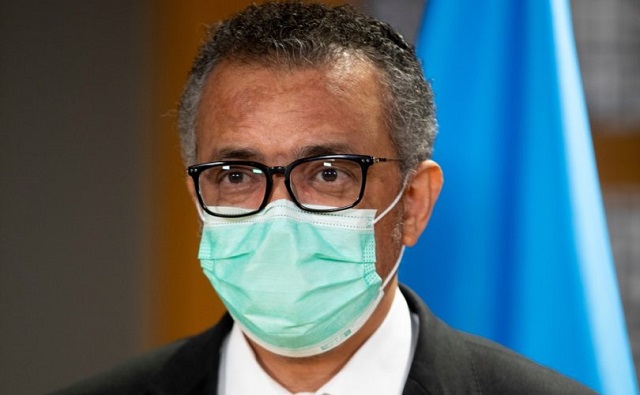Great Reset
‘The treaty is done’: WHO pandemic treaty defeated, at least for now

From LifeSiteNews
By Michael Nevradakis Ph. D., The Defender
The amendments to the International Health Regulations are far more threatening than the Pandemic Agreement because it can pave the way for a digital vaccination passport.
Also amendments are on the table providing that Member States have to organize within their national health system an authority that implements all instructions of the Director-General of WHO within their territory with intense obligations for surveillance.
Negotiations for the World Health Organization’s (WHO) proposed “pandemic agreement” – or “pandemic treaty” – and amendments to the International Health Regulations (IHR) have failed, for now at least.
The New York Times reported that negotiators failed to submit final texts of the two documents before the May 24 deadline for consideration and a vote at this year’s World Health Assembly taking place this week in Geneva, Switzerland.
The WHO said the proposals are intended to prepare for the “next pandemic.”
But critics called the proposals a global “power grab” that threatened national sovereignty, health freedom, personal liberties and free speech while promoting risky gain-of-function research and “health passports.”
“Sticking points,” according to The Times, included “equitable access to vaccines and financing to set up surveillance systems.”
Instead of considering a full set of proposals from both documents, a more modest “consensus package of [IHR] amendments” will be presented this week, according to the proposed text of the Working Group on Amendments to the International Health Regulations (2005) (WGIHR).
READ: 24 Republican governors tell Biden they will resist ‘unconstitutional’ WHO pandemic treaty
The text does not represent a fully agreed package of amendments and is intended to provide an overview of the current status and progress of the WGIHR’s work. …
The mandate of the WGIHR Co-Chairs and Bureau has now ended but we stand ready to support the next steps agreed by the Seventy-seventh World Health Assembly, including facilitating any further discussions if so decided.
The final report of the International Negotiating Body (INB) for the “pandemic agreement,” dated May 27, states “The INB did not reach consensus on the text.”
Mary Holland, CEO of Children’s Health Defense (CHD), credited global opposition to the WHO’s proposals for shutting them down. She told The Defender:
It is a huge tribute to civic action that the WHO treaty and regulations have apparently failed. While delegates to the World Health Assembly are still engaged in last-minute negotiations, outside of approved procedures they do not have a consensus to move forward with a legal infrastructure to conduct COVID operations.
This is great news for the world’s citizens and shows us how powerful we can be when we work together creatively.
The Times reported that negotiators plan to ask for more time. According to The Straits Times, “Countries have voiced a commitment to keep pushing for an accord.”
Opening the World Health Assembly on Monday, WHO Director-General Tedros Adhanom Ghebreyesus suggested efforts to finalize the two proposals will continue.
“We all wish that we had been able to reach a consensus on the agreement in time for this health assembly and crossed the finish line,” Tedros said, in remarks quoted by The Straits Times. “But I remain confident that you still will, because where there is a will, there is a way.”
Internist Dr. Meryl Nass, founder of Door to Freedom – an organization working to defeat the WHO’s proposals – celebrated the news and suggested the WHO’s efforts have failed irreversibly.
“The treaty is done,” Nass wrote on Substack. “Nothing in the treaty can rise from the ashes of the negotiations to be voted on this week.” She characterized the news as a “first round” win “in the war of democracy versus one-world government.”
WHO proposals ‘rolled out through lies and stealth’
Negotiations failed despite efforts by Tedros and others to persuade negotiators and WHO member states to agree on the two texts in time for a vote at the World Health Assembly.
At the World Economic Forum’s annual meeting in January, Tedros warned of the pandemic threat posed by a yet-unknown “Disease X” and said the pandemic agreement “can help us to prepare for the future in a better way because this is about a common enemy.”
In March, over 100 former world leaders, including former U.K. prime minister Tony Blair – a proponent of “vaccine passports” and digital ID – signed a letter urging WHO member states to finalize negotiations on the “pandemic agreement.”
Biden administration officials negotiating on behalf of the U.S. also pushed for the two documents to be finalized.
Loyce Pace, assistant secretary for global affairs at the U.S. Department of Health and Human Services, told The Times. “Those of us in public health recognize that another pandemic really could be around the corner.”
In December 2023, Pace testified before Congress in support of the two documents. “It’s only a matter of time before the world faces another serious public health threat,” she said, noting the U.S. role in drafting some of the proposed IHR amendments.
But according to Nass, the entire pandemic preparedness project has been rolled out through “lies and stealth.”
“Globalists created legal documents replete with euphemisms and flowery language, always disguised to hide the documents’ true intentions,” she said. “But we saw through them and didn’t let them get away with it.”
Nass wrote that the “consensus” on the IHR proposals delivered to the World Health Assembly are “the flowery language ones, not the meaningful ones.”
There is one exception, Nass said. Referring to Article 5 of the IHR amendments, she noted that “the negotiators were fine telling nations to surveil their citizens and combat misinformation and disinformation.”
“Nearly all governments are already surveilling and propagandizing us,” Nass said. “So, while this provision is odious, it really doesn’t change anything.”
She also noted that while consensus was reached on Article 18, the implementation of “health passports” and other similar documents during a health emergency is now a “recommendation” instead of a requirement. Definite language – such as the word “shall” – has been removed from the text.
‘They are not going to go away’
Other legal experts and health freedom advocates welcomed the news but said the WHO will likely continue pushing for the two proposals.
Australian attorney Katie Ashby-Koppens, who helped advocate for New Zealand’s rejection of a previous set of IHR amendments last year, told The Defender, “I don’t know that we should be celebrating the failure to reach agreement at this stage as a milestone.”
Journalist James Roguski told The Defender, “Member nations and the WHO have not given up. To the contrary, they have every intention of continuing in their attempts to finalize the negotiations.”
“Now is not the time to celebrate,” Roguski continued. “Now is the time to come together in order to take focused and massive action.”
Dutch attorney Meike Terhorst told The Defender, “According to my information, if the pandemic agreement fails, then they can continue negotiations later this year, with the view of trying again at next year’s World Health Assembly.”
Terhorst added:
We were informed that the World Health Assembly will not vote on the Pandemic Agreement this week, but the member states will vote on the amendments to the International Health Regulations. They are negotiating as we speak in Geneva and they are working towards a deal at the end of this week, probably Saturday, June 1, 2024.
The amendments to the International Health Regulations are far more threatening than the Pandemic Agreement because it can pave the way for a digital vaccination passport.
Also amendments are on the table providing that Member States have to organize within their national health system an authority that implements all instructions of the Director-General of WHO within their territory with intense obligations for surveillance. So we are by no means out of the danger zone. To the contrary.
“Given the WHO/World Health Assembly is a law unto themselves, and they desperately want these treaty reforms to pass, then the mandate to continue and finalize their negotiations may be extended,” Ashby-Koppens said.
Francis Boyle, J.D., Ph.D., professor of international law at the University of Illinois, told The Defender the WHO’s proposals were “the first time … that globalists spent an enormous amount of time, effort, money and brainpower to construct a worldwide totalitarian police state under the guise of protecting public health.”
Boyle said:
The WHO won’t back down from its proposals easily. They are not going to go away. They have come this far, and they will keep at it until they get their objective by hook or by crook. The only way to protect ourselves from these globalists is to pull out of the WHO.
But Nass believes the WHO may encounter difficulty in bringing back its proposals, telling The Defender it would be “unlikely to get far with either document unless they are pared down to what does not actually matter much to any nation.”
“I expect they will patch together a few [proposals] and vote yes and claim victory. But their major desires are all smashed,” Nass said. “They needed secrecy and ignorance, and they lost those advantages.”
Experts told The Defender a key factor in the WHO’s failure to achieve consensus on the two proposals was opposition from several nations – and by people worldwide.
“People and politicians around the world were educated about what was really being negotiated, what was really in the documents,” Nass said.
On Saturday, CHD participated in a rally against the WHO proposals, across from the United Nations headquarters in New York.
Watch Mary Holland speak at the New York rally here.
This article was originally published by The Defender — Children’s Health Defense’s News & Views Website under Creative Commons license CC BY-NC-ND 4.0. Please consider subscribing to The Defender or donating to Children’s Health Defense.
Banks
Wall Street Clings To Green Coercion As Trump Unleashes American Energy


From the Daily Caller News Foundation
By Jason Isaac
The Trump administration’s recent move to revoke Biden-era restrictions on energy development in Alaska’s North Slope—especially in the Arctic National Wildlife Refuge (ANWR)—is a long-overdue correction that prioritizes American prosperity and energy security. This regulatory reset rightly acknowledges what Alaska’s Native communities have long known: responsible energy development offers a path to economic empowerment and self-determination.
But while Washington’s red tape may be unraveling, a more insidious blockade remains firmly in place: Wall Street.
Despite the Trump administration’s restoration of rational permitting processes, major banks and insurance companies continue to collude in starving projects of the capital and risk management services they need. The left’s “debanking” strategy—originally a tactic to pressure gun makers and disfavored industries—is now being weaponized against American energy companies operating in ANWR and similar regions.
Dear Readers:
As a nonprofit, we are dependent on the generosity of our readers.
Please consider making a small donation of any amount here. Thank you!
This quiet embargo began years ago, when JPMorgan Chase, America’s largest bank, declared in 2020 that it would no longer fund oil and gas development in the Arctic, including ANWR. Others quickly followed: Goldman Sachs, Wells Fargo, and Citigroup now all reject Arctic energy projects—effectively shutting down access to capital for an entire region.
Insurers have joined the pile-on. Swiss Re, AIG, and AXIS Capital all publicly stated they would no longer insure drilling in ANWR. In 2023, Chubb became the first U.S.-based insurer to formalize its Arctic ban.
These policies are not merely misguided—they are dangerous. They hand America’s energy future over to OPEC, China, and hostile regimes. They reduce competition, drive up prices, and kneecap the very domestic production that once made the U.S. energy independent.
This isn’t just a theoretical concern. I’ve experienced this discrimination firsthand.
In February 2025, The Hartford notified the American Energy Institute—an educational nonprofit I lead—that it would not renew our insurance policy. The reason? Not risk. Not claims. Not underwriting. The Hartford cited our Facebook page.
“The reason for nonrenewal is we have learned from your Facebook page that your operations include Trade association involved in promoting social/political causes related to energy production. This is not an acceptable exposure under The Hartford’s Small Commercial business segment’s guidelines.”
That’s a direct quote from their nonrenewal notice.
Let’s be clear: The Hartford didn’t drop us for anything we did—they dropped us for what we believe. Our unacceptable “exposure” is telling the truth about the importance of affordable and reliable energy to modern life, and standing up to ESG orthodoxy. We are being punished not for risk, but for advocacy.
This is financial discrimination, pure and simple. What we’re seeing is the private-sector enforcement of political ideology through the strategic denial of access to financial services. It’s ESG—Environmental, Social, and Governance—gone full Orwell.
Banks, insurers, and asset managers may claim these decisions are about “climate risk,” but they rarely apply the same scrutiny to regimes like Venezuela or China, where environmental and human rights abuses are rampant. The issue is not risk. The issue is control.
By shutting out projects in ANWR, Wall Street ensures that even if federal regulators step back, their ESG-aligned agenda still moves forward—through corporate pressure, shareholder resolutions, and selective financial access. This is how ideology replaces democracy.
While the Trump administration deserves praise for removing federal barriers, the fight for energy freedom continues. Policymakers must hold financial institutions accountable for ideological discrimination and protect access to banking and insurance services for all lawful businesses.
Texas has already taken steps by divesting from anti-energy financial firms. Other states should follow, enforcing anti-discrimination laws and leveraging state contracts to ensure fair treatment.
But public pressure matters too. Americans need to know what’s happening behind the curtain of ESG. The green financial complex is not just virtue-signaling—it’s a form of economic coercion designed to override public policy and undermine U.S. sovereignty.
The regulatory shackles may be coming off, but the private-sector blockade remains. As long as banks and insurers collude to deny access to capital and risk protection for projects in ANWR and beyond, America’s energy independence will remain under threat.
We need to call out this hypocrisy. We need to expose it. And we need to fight it—before we lose not just our energy freedom, but our economic prosperity.
The Honorable Jason Isaac is the Founder and CEO of the American Energy Institute. He previously served four terms in the Texas House of Representatives.
Censorship Industrial Complex
China announces “improvements” to social credit system

 MxM News
MxM News
Quick Hit:
Beijing released new guidelines Monday to revamp its social credit system, promising stronger information controls while deepening the system’s reach across China’s economy and society. Critics say the move reinforces the Communist Party’s grip under the banner of “market efficiency.”
Key Details:
- The guideline was issued by top Chinese government and Communist Party offices, listing 23 measures to expand and standardize the social credit system.
- It aims to integrate the credit system across all sectors of China’s economy to support what Beijing calls “high-quality development.”
- Officials claim the new framework will respect information security and individual rights—despite growing global concerns over surveillance and state overreach.
Diving Deeper:
China is doubling down on its social credit system with a newly issued guideline meant to “improve” and expand the controversial surveillance-driven program. Released by both the Communist Party’s Central Committee and the State Council, the document outlines 23 specific measures aimed at building a unified national credit system that will touch nearly every corner of Chinese society.
Framed as a tool for “high-quality development,” the guideline declares that credit assessments will increasingly shape the rules of engagement for businesses, government agencies, and individual citizens. The system, according to the National Development and Reform Commission (NDRC), has already played a role in shaping China’s financial services, government efficiency, and business environment.
Critics of the social credit system have long warned that it serves as an instrument of authoritarian control—monitoring citizens’ behavior, punishing dissent, and rewarding obedience to the Communist Party. By integrating credit data across all sectors and enforcing a “shared benefits” model, the new guideline appears to entrench, not ease, the Party’s involvement in everyday life.
Still, Beijing is attempting to temper foreign and domestic concerns over privacy. The NDRC emphasized that the system is being built on the “fundamental principle” of protecting personal data. Officials pledged to avoid excessive data collection and crack down on any unlawful use of information.
-

 2025 Federal Election1 day ago
2025 Federal Election1 day agoMark Carney refuses to clarify 2022 remarks accusing the Freedom Convoy of ‘sedition’
-

 2025 Federal Election1 day ago
2025 Federal Election1 day agoPoilievre To Create ‘Canada First’ National Energy Corridor
-

 Bruce Dowbiggin1 day ago
Bruce Dowbiggin1 day agoAre the Jays Signing Or Declining? Only Vladdy & Bo Know For Sure
-

 2025 Federal Election1 day ago
2025 Federal Election1 day agoFixing Canada’s immigration system should be next government’s top priority
-

 International12 hours ago
International12 hours agoTrump’s ‘Golden Dome’ defense shield must be built now, Lt. Gen. warns
-

 Catherine Herridge9 hours ago
Catherine Herridge9 hours agoFBI imposed Hunter Biden laptop ‘gag order’ after employee accidentally confirmed authenticity: report
-

 2025 Federal Election10 hours ago
2025 Federal Election10 hours agoDon’t let the Liberals fool you on electric cars
-

 Daily Caller1 day ago
Daily Caller1 day agoBiden Administration Was Secretly More Involved In Ukraine Than It Let On, Investigation Reveals


